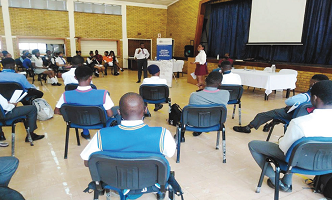Department of Social Development 2020/11/02 - 22:00

Schools should be safe places where every child enjoys their fundamental right to education. Yet, throughout the world, reports show that violence in schools remains a problem. Girls and boys who are seen as soft are mostly the main victims of bullying, name-calling, physical violence and sexual violence. These experiences in schools affect children’s concentration and academic performance.
In an effort to tackle the scourge of this violence in schools, the Gauteng Department of Social Development through its school psycho-social support service unit hosted a debate with learners from Sedibeng West District schools at JC Kotze Hall in Sebokeng, last Saturday.
Speaking to the learner’s Social Work Supervisor, Patricia Malinga, said the objective of the debate was to afford learners opportunity to engage on issues related to bullying and gender-based violence (GBV) in their schools that affect them. The debate sought to ensure prevention and early detection with regards to these two issues in schools. Malinga further stated that in as much as they educate and empower learners with skills to deal with bullying and gender-based violence in schools, the department also wants them to be part of the solution on what can be done to address unruly behaviour displayed by your fellow learners.
Many learners said unequal gender norms and power relations are a key driver of this violence, manifesting itself as bullying and physical abuse. They said school-related gender-based violence and bullying affects many children, families and communities and it has consequences in learners’ lives, ranging from low self-esteem to depression. They said violence also has a serious impact on educational outcomes, with many students avoiding school, achieving below their potential, or dropping out of school completely.
A grade nine learner at Lebogang Secondary School, Lindiwe Khoza (14), said when they talk about bullying in schools they often think about boys as perpetrators, however, society must not downplay the fact that there are young girls who are also perpetrators. She said often boys talked about violence in their communities and at home, where cultural norms have established males as powerful authorities in families which is a notion that must be changed.
This was echoed by another learner, Themba Mnyongula (16), from Boitumelo High School who said violence was often used as an expression of frustration and power. Boys sometimes learn from an early age that violence is a means to power and use it in schools to achieve status and privilege.
“Bullying is problematic as it affects people in different ways, when you are being bullied, you can feel constantly insecure. Even if you’re not actively being bullied, you’re aware it could start anytime. It has a big mental and emotional impact, sometimes it makes people feel unaccepted, isolated, angry, and withdrawn” said Mnyongula.
RELATED NEWS
No related news

